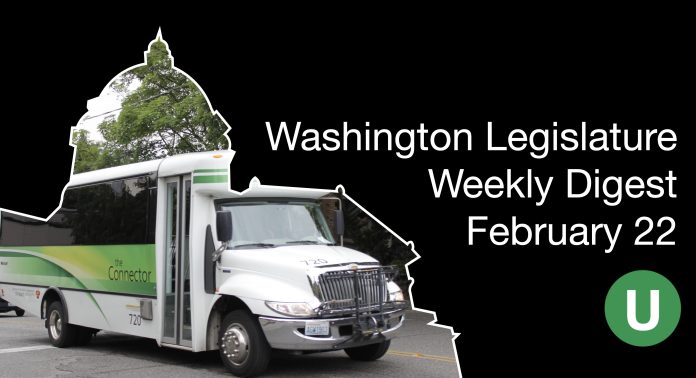WALeg Wednesday faces another calendar cutoff and looks at lobbying efforts by agencies, organizations, and corporations.
The Washington Legislature is in the week between legislative calendar cutoffs, so there is some tumult in what bills are moving forward. As discussed last week, the calendar cutoffs are deadlines imposed by the legislature to keep things moving in their part-time sessions. The first policy cutoff has passed, and quite a few pieces of legislation have escaped their initial committees. However, the budget and transportation cutoff is looming this Friday, February 24th.
A number of bills — including the big missing middle bill HB 1110 — have met the first cutoff but have been passed to the appropriations committee. That means they are still subject to the second cutoff, so they are in a bit of will-they, won’t-they limbo at the moment.. Here’s a run down of the bills we have been tracking. Any that are still hanging out between policy committee and a budget or transportation committee are labeled in LIMBO. By clicking on the link to the bill, it is still possible to send a note to your legislator supporting the legislation.
- HB 1110 – Missing Middle is in LIMBO
- Out of Housing. Scheduled for executive session in Appropriations 2/23.
- Companion SB 5190 – Out of Housing. Referred to Ways and Means without a committee hearing scheduled.
- HB 1181 – GMA Climate Change provisions is MOVING
- Out of Local Government. Out of Appropriations, not read on the floor yet
- Companion SB 5203 – Out of Local Government. Referred to Ways and Means without a committee hearing scheduled.
- HB 1045 – Evergreen Basic Income pilot LIMBO
- Out of Human Services. Referred to Appropriations without a committee hearing scheduled.
- HB 1026 – Local Government Design Review Reform MOVING
- Out of Housing. Not read on the floor yet.
- HB 1131 – WRAP Act (bottle deposit and packaging reform) LIMBO
- Out of Environment. Scheduled for executive session in Appropriations 2/23.
- Companion SB 5154 – Out of Environment. Referred to Ways & Means with no hearing scheduled.
- HB 1040 – Aviation and Aerospace Advisory Committee KAPUT
- Did not pass Innovation committee before cutoff.
- SB 5466 – Promoting Transit Oriented Development LIMBO
- Out of Local Government. Scheduled for executive session in Transportation 2/23
- Companion HB 1517 – Did not pass Housing before cutoff.
- SB 5383 – Concerning Pedestrians Crossing and Moving Along Roadways LIMBO
- Scheduled for executive session in Transportation 2/23.
- Companion HB 1428 – In Transportation without an executive session scheduled.
- HB 1124 – Protecting Tenants from Excessive Rent and Related Fees MOVING
- Out of Housing. Referred to Rules with no floor reading scheduled.
- HB 1388 – Protecting Tenants By Prohibiting Predatory Residential Rent Practices LIMBO
- Out of Housing. Referred to Appropriations with no hearing scheduled.
- HB 1389 – Residential Rent Increases Under the Landlord Tenant Act LIMBO
- Out of Housing. Executive session in Appropriations 2/24.
- Companion SB 5435 – No action taken in Housing before cutoff.
So, for those keeping score of the 11 bills we’re tracking, two are moving ahead and eight are in the between-week appropriations nether region. One bill is kaput, and that’s okay because there were some questions on whether HB 1040’s proposed Aviation and Aerospace Advisory Committee was going to be useful when it didn’t consider the environment until a deep footnote.
This Week’s Focus: Organization, Agency, and Corporate Legislative Priorities
The big board is going to look somewhat different next week, so this is an opportunity to take a breather and track down some legislative priorities by organizations that may not often get attention. The Urbanist’s focus on housing and environment necessarily turns attention towards Futurewise’s work to promote smart growth and breathable air, contrasted with the Association of Washington Cities’ work to cry “local control” at every turn. But there are other organizations that are showing up in Olympia and bending legislators’ ears.
There are the local branches of national organizations. A lot of housing bills have been supported by groups like the American Farmland Trust, who have Washington specific legislative priorities that include preserving farmland through land use protections and building more housing in existing urban footprints. They also support programs that broaden the demographics of farmers and promote conservation and preserving soil health. Washington State PTA has similar announcements of legislative priorities in that same big picture language, then keep a running tally of bills on their blog.
Alternately, the American Civil Liberties Union does a good job deep diving on specific pieces of legislation with a full list of supported bills. This year, the ACLU is keeping abortion and gender affirming care at the top of its priorities, backing the HB 1469 protections of reproductive and gender affirming care in Washington. The organization’s work with decriminalizing drug possession and reducing incarceration has a list of bills that raise the age on juvenile detention and engages alternatives to jail. Unfortunately, a few of the bills they supported about online privacy and regulating automated decision systems did not make it out of committee, even with some interesting background info on the topic.
Cities are often noted lobbyists themselves and this year is no different. Seattle’s City Council passed a resolution of legislative priorities that hits on transit, housing, education, and public safety. Most other regional jurisdictions have something similar, from Mercer Island to Tacoma. The big schools get in on the action also, as the University of Washington’s and Washington State University’s respective legislative agendas make requests of the operating and capital budgets.
Interestingly, Puget Sound Regional Council (PSRC) and Sound Transit also have state legislative priorities. PSRC’s wish list “ supports adoption of state legislation that provides an exceptional quality of life, opportunity for all, connected communities, a spectacular natural environment and an innovative, thriving economy in alignment with adopted regional plans.” Sound Transit is mostly asking for funding and permit approval to deliver services on time, plus authorizing transit oriented development (TOD).
Of note is how the boards of both of these organizations are comprised of elected officials that also represent their own jurisdiction’s legislative priorities in Olympia and also get a voice via those of groups like the Association of Washington Cities. It’s not a conflict of interest so much as a quiet sandbagging. PSRC’s housing push of “build more housing” tiptoes around the local control issue while Sound Transit’s TOD push makes makes more reference to partner agencies than it does building houses. These highlight the layers of interlocking barriers to legitimate and lasting change.
What can get overlooked are the public agencies that have legislative priorities. The state’s Attorney General produced a list including public safety and public health, but also the very interesting SB 5087 – Correcting Defects In State Law that is positively tearing through the legislative process. It’s a cleanup bill, changing 40-some parts of state law that have been held unconstitutional, everything from malpractice claims by minors, to community councils in counties made up entirely of islands, to preliminary injunctions for adult entertainment facilities.
The Washington Department of Natural Resources has a list of cited bills in their priorities, including removing derelict aquatic structures, managing geoduck, and addressing wildfires. On the education side, the Office of the Superintendent of Public Instruction is a little more aspirational in policy enhancements they’re seeking. Except for the Biennium Operating Budget requests. Those are very specific.
Last of all, there are the corporate interests in Olympia. Homebuilders and Realtors often get mentioned around here, but Washington is home to a few somewhat large corporations. Most of the times they get involved in politics, it’s not pretty, so it is rare that the companies mention their legislative priorities. A little bit of a change this year as Microsoft came out with a list focusing on data privacy, energy, affordable housing, and education. Again, a little more in the general or aspirational category, but does include a lot of references to good studies about housing. But, as with many of these organization’s legislative priority announcements, it can speak as loudly what it supports as what it omits, such as tax policies.
Ray Dubicki is a stay-at-home dad and parent-on-call for taking care of general school and neighborhood tasks around Ballard. This lets him see how urbanism works (or doesn’t) during the hours most people are locked in their office. He is an attorney and urbanist by training, with soup-to-nuts planning experience from code enforcement to university development to writing zoning ordinances. He enjoys using PowerPoint, but only because it’s no longer a weekly obligation.



